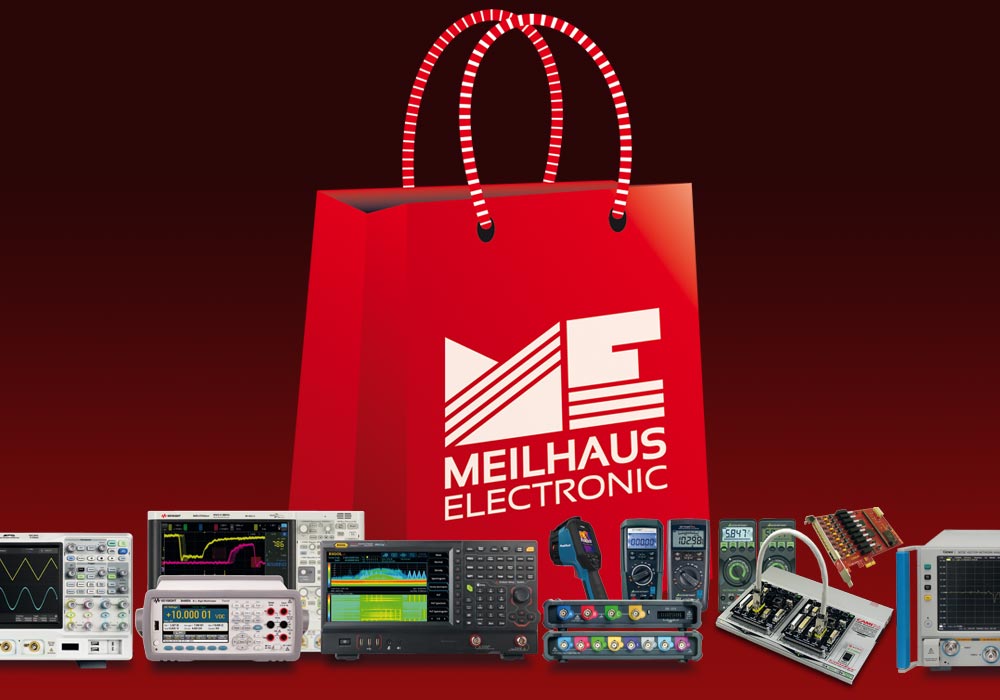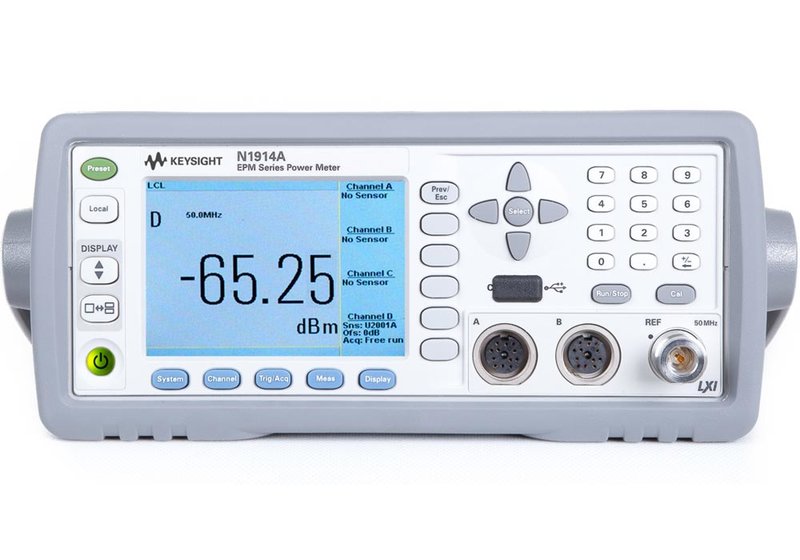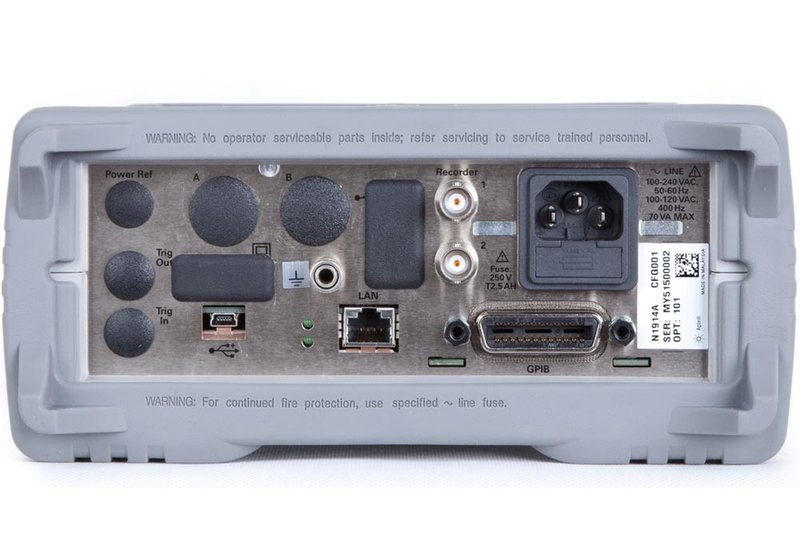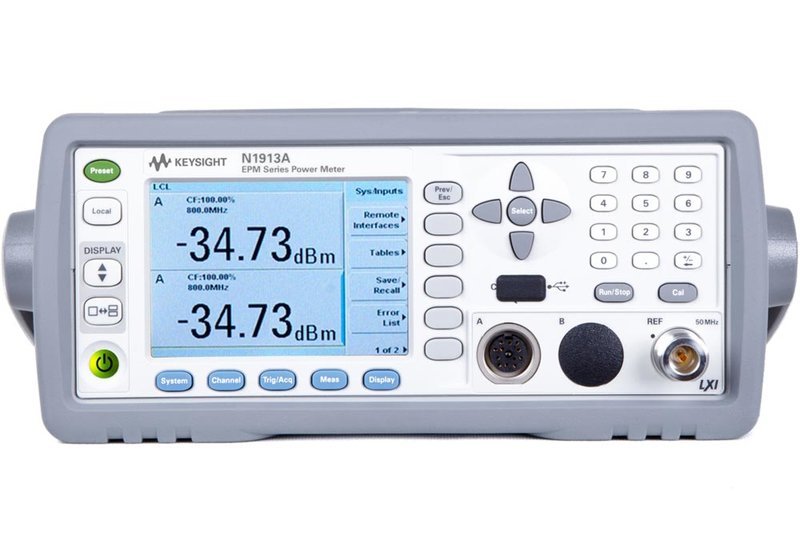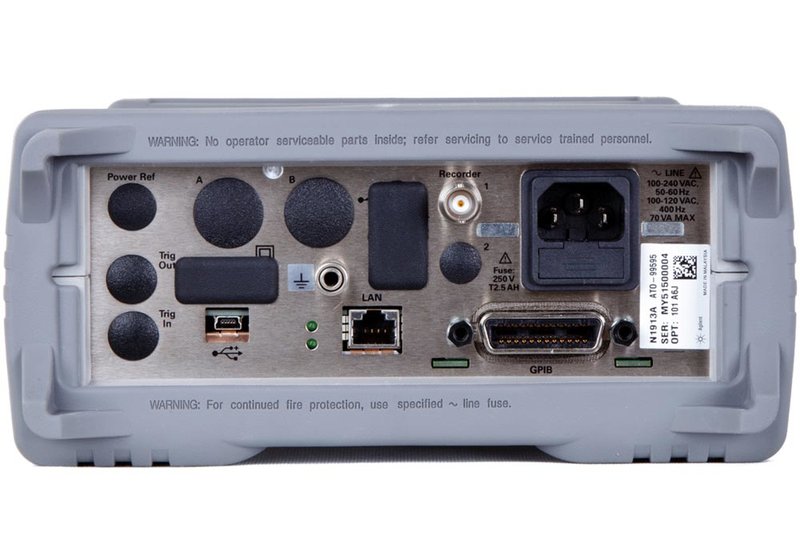Keysight N1913A, N1914A EPM-Serie 1-/2-Channel RF Power Meters
EOL/obsolete. ▸Click here to find replacement models.
Benefits of the N191xA EMP Series Average RF Power Meters
- Supports all average power sensors and their frequency range (power range depends on connected sensor).
- Measurement speed up to 400 readings/s with E series sensors.
- Accuracy ±0.02 dB logarithmic/±0.5% linear (absolute), ±0.04 dB logarithmic, ±1% linear (relative).
Keysight N1913A, N1914A EPM-Serie 1-/2-Channel RF Power Meters
The Keysight EPM series power meters offer a measurement speed of up to 400 readings/s for fast, accurate average power measurements, They come with a color LCD screen, allowing you to view and analyze test data more easily. A noteworthy enhancement from the conventional dual-channel power meter, EPM Series power meter enables four-channel power measurement by connecting U2000 series USB power sensors via optional USB host. The N1913A and N1914A EPM series power meters support a wide range of sensor options. They are compatible with all E9300 series sensors (except E9320 series sensor), E4410 series sensors and N8480 series sensors.
- Frequency range 9 kHz...110 GHz (sensor dependent).
- Wide dynamic range -70...+44 dBm (sensor dependent).
- Widely code-compatible with E4418/19B power meters and 436A/37B/38A power meters (option 200).
- Increased measurement channels: Up to three/four channels with two additional U2000 series power sensors connected using the optional USB hosts.
- Automated frequency/power sweep measurements with the optional external trigger in/out feature.
- A BenchVue software license (BV0007B) is now included with your instrument. BenchVue makes it simple to connect, control instruments, and automate test sequences.
- LAN LXI-C, USB, and GPIB connectivity.
Model Overview
| Model | N1913A | N1914A - EOL/obsolete |
| Description | Single channel average power meter | Dual channel average power meter |
| Compatible power sensors | Keysight 8480 series, E9300 E series, E4410 E series, N8480 series, E8486A, V8486A, W8486A, U2000 series, U8480A series, U2040x series (except U2049X series and in average mode only) | |
| Frequency range | 9 kHz...110 GHz, sensor dependent | |
| Power range | –70...+44 dBm (100 pW...25 W), sensor dependent | |
| Single sensor dynamic range | 90 dB maximum (Keysight E series power sensors) 50 dB maximum (Keysight 8480 series power sensors) 55 dB maximum (Keysight N8480 series power sensors) 80 dB maximum (Keysight U2000 series USB power sensors) 55 dB maximum (Keysight U8480A series USB power sensors) 96 dB maximum (Keysight U2040x series, except U2049X series and in average mode only) | |
| Display units | Absolute: Watt or dBm; relative: Percent or dB | |
| Display resolution | Selectable resolution of 1.0, 0.1, 0.01 and 0.001 dB in logarithmic mode, or 1, 2, 3 and 4 significant digits in linear mode | |
| Default resolution | 0.01 dB in logarithmic mode or three digits in linear mode | |
| Measurement speed | Using remote interface (over the GPIB, USB or LAN), three measurement speed modes are available as shown, along with the typical maximum measurement speed for each mode:
| |
| Power meter functions |
| |
| Interfaces | USB 2.0, Ethernet/LAN (LXI-C), GPIB, SCPI compatible, optional VGA, optional USB-Port for additional sensor connection | |
Included: Power meter Keysight N 1913 A or N 1914 A, power cord, power sensor cable (1.5 m, one per N1913A, two per N1914A), USB cable type A to mini-B.
Agilent’s Electronic Measurement Group is now Keysight Technologies.
Related Products






















